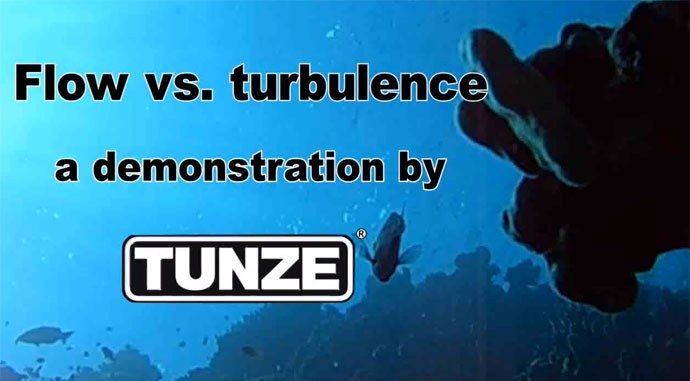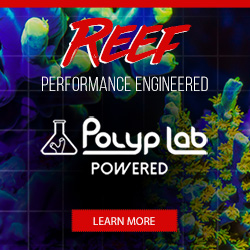For context, please read the Advanced Aquarist article: “Experimental Comparison of Measured Flow Output of Aquarium Propeller Pumps”
The video and text below is provided by Tunze.
What does the video mean….
There has been much discussion about the Flow Vs. Turbulence video and what it means and what it shows. Many misinterpret what they are seeing as wide flow vs focused flow. This short article will explain our findings.
We set out to increase the flow of our pumps, we had two simultaneous flow meters running, one at the position in the video and one at the end of the tank. We found that while we were able to match our competitors pumps output on the meter at the pump, flow reach dropped dramatically and the flow meter became more and more unstable in its readings. We tired everything, we had alternate coil windings, alternate propellers and housings and literally dozens were tried. Certainly one has a mental picture of what 8000 gph should look like, compared to roughly 3400 gph it should appear like the pitting a Lamborghini against a base Chevrolet, but that isn’t the reality.
Then, we had a Eureka moment, the law of conservation of energy states energy can neither be created nor destroyed. Our equivalent pumps use roughly equivalent amounts of energy. We cannot accurately calculate the losses comparatively, for example the competitors pump is louder but our pump is submersed and water mutes much of the noise, and there pump is air cooled while ours is water cooled so heat losses are also hard to accurately compare. But let us assume the losses are roughly equal to waste energy of noise, vibration and heat. This means we both put roughly the same amount of energy into water.
Enter the next physical principal, entropy! In nature all systems have a tendency to there lowest energy state, for flow, this is turbulence. Watch a river, notice how at a narrowing of the channel the flow accelerates to a nice laminar flow of high velocity, then downstream the channel widens and hits obstacles and is reduced to turbulence, just swirling visible at the surface. Tubulence is a flow which lacks the y axis of directional energy and has only the x axis of velocity. This explains exactly our findings and shows why the flow meters were wrong and fundamentally why lph or gph measured by a velocity meter is unreliable. It deducts the necessary directional energy. Turbulence as a lower energy state generates a high velocity without a directional energy component, our pumps produce energy in both axis and the amount of energy we add to the water is equivalent, only the form it takes has changed. The width of the flow is not the point, we can deliver also a wide flow with a higher directional axis component and this is already in development. But you cannot get a substantially higher laminar flow rate without a substantially larger motor. A higher wattage input is required and tweaks to efficiency are modest as in general the pumps are near the maximum efficiency possible within the confines of modern mechanics.
We expected to find some substantial error in our design, a shortage of intake area for example, we analyzed every factor, for example a 6305 has 8350 sq mm of intake surface our competitors pump has 8000 sq mm, in the end the only difference was the resulting form of the energy and we feel our flow form is more suitable and the lessons we have learned will result in substantial improvements and options for wider flow over the next 6-9 months. Bottom line, the pumps are the same, but different and we need another descriptor besides gph to have any real world value.











0 Comments